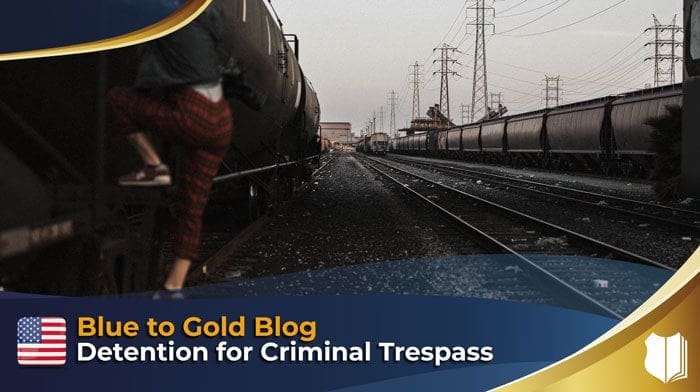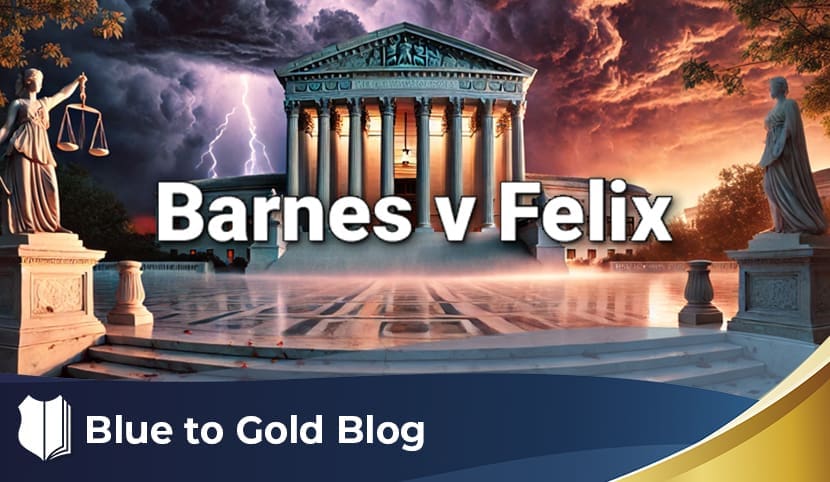Here is our next question: Can police detain someone to issue a criminal trespass warning if they leave the location after being warned?
I’ll explain what’s kind of going on here. This officer is in Texas. He asks: If a business owner or homeowner has told a subject to leave their property, and that subject complied with their request to leave immediately, can the owner still get them criminally trespassed?
Are we allowed under the Fourth Amendment to stop the subject subject, identify them and issue that criminal trespass warning? Would the answer change if they didn’t comply the first time they were asked?
Now, sometimes the answer depends on state criminal law. Constitutionally, I think the best answer is, if the person has complied with the order to leave the property, don’t detain them.
You, as a law enforcement officer, are allowed to detain people under two conditions: One, with reasonable suspicion and Two, with probable cause.
You don’t have probable cause here, because the person immediately complied. They left, as they are supposed to. And you don’t have reasonable suspicion here, because you don’t have any facts or circumstances that would lead a reasonable police officer to believe that criminal activity is afoot. So why would you detain them?
Can you try to engage in a consensual encounter? Yes. But why wouldn’t they come back? And how do we prove that? Let the landowner prove that, if maybe they got video, maybe they took a picture.
You can’t get involved and use your police power for this issue. In my view, it’s not a police issue. If the guy comes back, let that landowner explain to the police how this person has already previously trespassed, and what proof they have. That’s on them.
Now, I think it does change if the person actually did violate the law, in the sense of “I’m staying here.” And then, finally, the landlord’s saying, “Well, I’m calling the cops.”
There’s a fair probability based on the facts and circumstances that you know, at this time, that they have violated the law if they did not leave and they committed some form of criminal trespassing. Do I believe that you can stop them and potentially identify them? The answer is, “yes,” because these criminal trespass laws do not require that the that the victim wants to prosecute.
If you look at these these trespass laws, they normally say something like, “After a sufficient warning, if the person refuses to leave the property, that equals a criminal trespass.” That’s what it says. It does not say, “and you have to have a landowner willing to press charges.”
Now, in reality, if you do not have a landowner willing to participate and cooperate and press charges, then cops usually don’t take any enforcement action. Even if they did, the prosecutor is probably going to throw out the charges because they need a witness.
That’s a different issue. Remember to separate those two out. We are talking about what happens on the street versus what happens in court.
What happens on the street, if you have probable cause that the person violated the law, is you are allowed to conduct an investigation. So if you want to stop them, then stop them.
Now let’s talk about my (Anthony’s) best practice. If you have a landowner saying, “I don’t want to press charges, I just want them identified and so forth,” I would not get involved. I’m sorry, but I just would not get involved. It’s not worth it to me with these very minor cases.
I’m not saying I wouldn’t try to have a consensual encounter with the person as in; “Hey, can I talk to you for a second?” But if the guy says to pound sand, why am I putting my badge on the line here for this landowner who doesn’t want to press charges? You feel what I’m saying here, right?
Do I want to put my badge on the line here, use force on this guy, put some hands on him all because some landowner just wants his information? No, I’m not Pinkerton. I’m not a private security force. I’m a police officer, right? I’m not putting hands on people just because someone wants this guy’s name. That’s what I would do; I would let him go.
Alright, I hope it helps move the ball forward. Use good judgment. That’s my mantra here, and that’s my motto. My mantra is, “Let’s make good case law.” Let’s not give courts any extra reason to not support what we’re doing out there. Use good judgment. That’s for a guy committing a serious crime and so forth. That’s totally different.
Alright. This officer says, “I appreciate all you do. Great stuff! It really helps educate us and helps us remain constitutional.” And I thank you for that feedback. Before you leave, share with your friends, I appreciate it. Try to get this forum used by as many cops as possible. Until next time, my friends stay safe.








